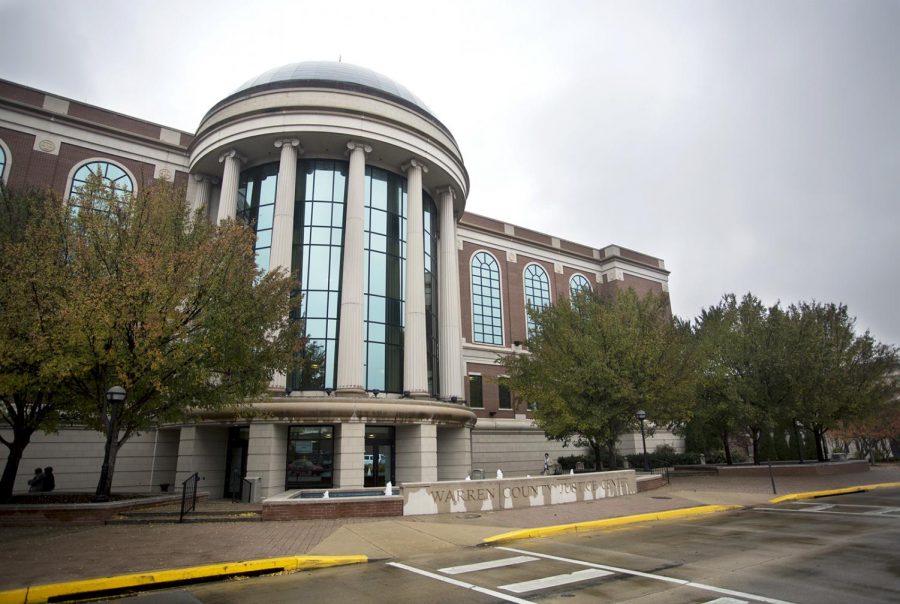Judge to consider letting AG review records in WKU lawsuit against Herald
April 6, 2018
Attorneys for the College Heights Herald and WKU appeared in court today for oral arguments in the latest installment in the Herald and WKU’s legal battle over open records.
Arguments centered around whether the attorney general’s office had the right to perform an in camera review of the documents requested by the Herald and if the requested records amounted to education records under the Family Educational Rights and Privacy Act, or FERPA.
WKU sued the Herald in February 2017, after WKU denied an open records request by a Herald reporter in November 2016, for records concerning sexual misconduct allegations against employees at the university. WKU has acknowledged there had been 20 investigations since 2013 with six cases found to be in violation of university policy.
The Herald challenged WKU’s denial to the attorney general, who ruled that the university was in violation of Kentucky’s Open Records Act and must turn over the records to the Herald.
WKU then sued the Herald, arguing that turning over the records to the attorney general or to the Herald would constitute a violation of FERPA, which they said could lead to WKU losing federal funding. They also claimed FERPA overrules the Open Records Act, because FERPA is a federal law.
FERPA protects access to students’ educational records and limits the information schools can share about students. WKU’s attorneys have said releasing the sexual misconduct documents violates FERPA because of the information in the documents that identifies students who may have been victims or witnesses, and therefore cannot be turned over to the attorney general.
“How are we going to make sure that the AG is not going to disclose these records to any outside party or the Herald?” WKU’s attorney, Ena V. Demir asked in her argument. “They’ve been working closely on this case together.”
The Herald’s attorney argued that once the Title IX records are properly redacted, removing student information, then they no longer are education records. Previous court rulings, both in Kentucky and at the federal level, have settled the issue, attorney Michael Abate said.
“The name of the faculty member, what the faculty member was alleged to have done, what the university concluded about and what the sanction was,” Abate said. “Absolutely we have the right to know.”
Abate claimed in his argument that once names and anything else that could identify students was redacted from the records, that the records were no longer subject to FERPA rules and must be surrendered by the university.
He cited a case involving the Lexington Herald-Leader’s request for records relating to child abuse, in which the state claimed that releasing records would constitute a violation of the law and risk federal funding, imposing a blanket denial of the records request.
“That case went up to the Court of Appeals,” Abate said. “The Court of Appeals held not only was the blanket policy a violation of the Open Records Act, it was a willful one, because the Kentucky Open Records Act, where federal law says you may disclose certain information, the Open Records Act says you must, and it’s the very same principle here.”
Of the 20 cases which WKU has acknowledged, Warren Circuit Judge Steve Wilson said that four of those cases did not involve students at all, but involved solely faculty or staff members.
Wilson said he has seen the documents in both redacted and unredacted form, and said that while he considers the unredacted records to be educational documents, he was considering ordering the university to turn the redacted records over to the attorney general for review.
He also said, in his reading of both the redacted and unredacted documents, that he arrived at different conclusions as to what had transpired in these cases of misconduct.
“I think it was clear from the judge that the judge sees the attorney general, under statute, has access and adjudicative authority when we’re reviewing open records appeals, in order to make a decision on open record appeals,” S. Travis Mayo, assistant attorney general, said after the arguments. “As part of that adjudicative authority, the Attorney General by the same statute has the right to request the records involved in an open records appeal, to conduct a confidential, in camera review, with no public disclosure of the records in that review.”
For disclosure purposes, Mayo is a former sports editor for the Herald.
After the arguments, both sides felt they had done a good job of making their case to the judge.
“I think we did an excellent job in proving our point that FERPA does apply here,” Demir said. “These Title IX investigative records are educational records under FERPA, and therefore, they’re protected from disclose to the Herald, the [Kentucky] Kernel and even the AG.”
Abate was also pleased with the way he saw the case playing out.
“I was very glad to see that the judge really seemed to understand that the statute that university is relying upon doesn’t create grounds for blanket withholdings of all Title IX records,” Abate said “He really focused on the question that we had pushed – once these records are properly redacted, to remove student names, they cease to be education records and therefore, we think that means, as a matter of law, they should be assessable to the public.”
Abate said he expects a ruling on whether the attorney general will have access to the records within the next 30 days. At that point, the attorney general’s office would determine whether the records WKU submitted were overly or properly redacted, a question that could wind up back in Wilson’s courtroom.
“The level of redaction is the next question,” Wilson said.
Read our continued coverage of WKU’s lawsuit against the Herald here.
News reporter Matt Stahl can be reached at 270-745-6011 and [email protected].












